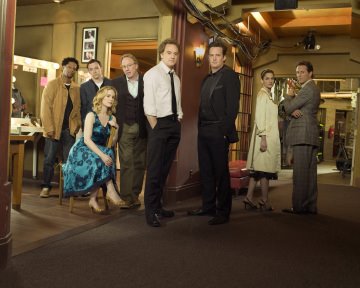 I'm mad as hell and I'm not going to be able to take it much more before giving you "Studio 60" spoilers...
I'm mad as hell and I'm not going to be able to take it much more before giving you "Studio 60" spoilers..."Studio 60" may have had the least secretive pilot of all time. The original script (including the wisely-deleted Maureen Dowd character) was being passed around Hollywood and on the Internet for months, and the final version has been available on Netflix since August. I said a whole lot about the pilot (and a bit about the second episode) in this morning's review column, so I'll just hit a few specific likes and dislikes and then open the floor. We can get into more detailed analysis next week.
The good:
- Wes' Howard Beale moment, though I can't decide how I feel about the newscasters' uninamously making the reference: is it the obvious, hack-y thing they all would do, or a chance for Aaron to show off the homage to a 30-year-old movie, even though the youth-obsessed business Wes was just trashing might not want to go that old and obscure?
- Matthew Perry, who's good this week and even better next week. Interesting choice keeping the main characters off screen for half the pilot, but Perry and Whitford play off each other very well.
- Steven Weber, totally believable as an arrogant prick of a network executive.
- Tim Busfield, who will also be directing the show in real life on occasion.
- Tommy Schlamme, who will be directing a lot and is just a master at this point. (Though would it kill the guy to screw in a few more lightbulbs?)
- Amanda Peet, unbelievable and more than a little creepy floating around in that gown and smiling constantly. She's much better next week, but it's not a good start, and the pilot hangs on her a lot more than it does Perry and Whitford.
- I don't like the Sarah Paulson character at all. She seems to be there for two reasons, neither of them dramatically interesting: to allow Sorkin to work out his break-up issues with Kristin Chenoweth, and to get in his usual shots at the religious right while saying, "See? See? I'm not saying all Christians are horrible, just some of them!" Whatever the reason, she comes off as kinda shrill (even moreso next week) and sort of the "Studio 60" equivalent of Arnie Vinick: a non-Christian's fantasy of what the ideal Christian might be. Difference was, Alan Alda made me believe the fantasy; Paulson doesn't, not yet.
- The Mary Sue-ishness, though I feel I've beaten that dead horse enough for now.
- A general sense of smugness, of "We're really too good for television, but we'll do our best to elevate your silly medium."
















No comments:
Post a Comment